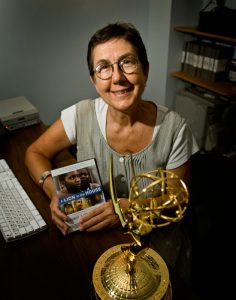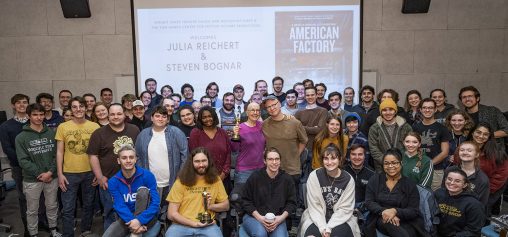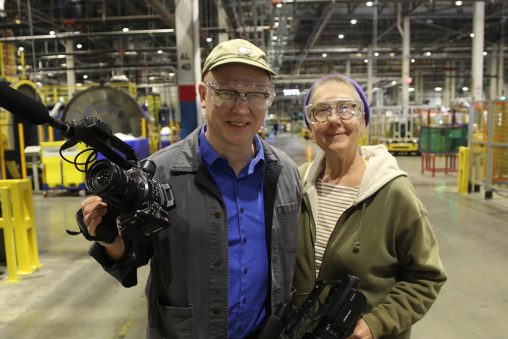
Oscar-winner Julia Reichert taught film production at Wright State for 28 years, leaving a lasting impact on dozens of filmmakers.
Julia Reichert, a longtime film professor at Wright State University who was known as the “godmother of American independent documentaries,” died at her home in Yellow Springs. She was 76.
Over her 50-year career as a filmmaker and teacher, Reichert was an active builder of the American documentary community. Her films, co-directed with longtime Wright State professor Jim Klein and later with former Wright State faculty member and alumnus Steven Bognar, have given voice to women and working people, infusing their stories with urgency and dignity.
Reichert, professor emeritus of motion pictures, and Bognar won the Oscar for best feature documentary for “American Factory” in February 2020.
“Our film is from Ohio and China,” Reichert said during her acceptance speech. “… But it really could be from anywhere that people put on a uniform and punch a clock, trying to make their families have a better life. Working people have it harder and harder these days. We believe that things will get better when workers of the world unite.”
“American Factory” also received the Best Directing Award for U.S. Documentary at the 2019 Sundance Film Festival. The documentary was produced by Higher Ground, Barack and Michelle Obama’s production company, and is available to stream on Netflix.
Joe Deer, artistic director of Wright State Theatre in the School of Fine and Performing Arts, described Reichert as an exemplary teacher, artist, colleague and social force.
“What makes her such an impactful educator and mentor is that she’s spent her life telling the stories of everyday, overlooked people with compassion and real appreciation for their dreams and struggles,” Deer said. “And many of those stories are told in our own backyard – hospitals in Cincinnati, workers in Dayton, her neighbors in Yellow Springs. I’m personally so grateful for my years watching her work, talking about teaching and just being inspired by her energy and vision.”
Reichert and Bognar involved numerous Wright State faculty members, staff, students and alumni in their films, including “American Factory.”
Professor emeritus Stuart McDowell, who served as chair of the former Department of Theatre, Dance and Motion Pictures for nearly 25 years, said Reichert’s most significant impact was her work with students and Wright State alumni. By working with them on her films, McDowell said, she led by example.
“Her life will live on in the work that she has done,” McDowell said. “It will also live on in her students who will in turn train other filmmakers because the generosity of spirit that she manifested in her life was unique and it’s a real blessing and a gift.”

With Oscars in hand, Wright State professor emeritus Julia Reichert and former motion pictures faculty member Steven Bognar celebrated their Academy Award with students and faculty from the College of Liberal Arts in the Tom Hanks Center for Motion Pictures.
Four days after winning the Oscar, Reichert and Bognar celebrated with about 100 students and faculty from the College of Liberal Arts in the Tom Hanks Center for Motion Pictures. The film was developed when Bognar served as a faculty member in the College of Liberal Arts.
“American Factory,” which Reichert and Bognar directed and produced, focuses on the opening of the Fuyao Glass America plant at the site of a former General Motors truck plant in Moraine. The documentary captures the complicated relationship between Fuyao, the Chinese glass manufacturer that owns the new plant, and its American employees, some of whom worked at the GM truck plant before it closed in 2008, putting more than 1,000 workers out of jobs.
Reichert described “American Factory” as a film about whether the plant and the endeavor to merge American and Chinese cultures will succeed and what that success looks like for the blue-collar workers compared to the plant owner, managers, engineers and supervisors.
“They all have a different sense of what success is for them,” she said. “That’s one reason the film has so many points of view. Everybody is going through something hard in that film. Everybody is trying really hard. And you have to honor that and recognize the situation you’re filming.”
For 28 years, Reichert was a professor of film production at Wright State and mentored dozens of emerging filmmakers. During the 2020 Oscar celebration at Wright State, she encouraged students who want to make documentaries to embrace the unpredictable nature of the filmmaking process. Don’t flinch when something uncomfortable happens, Reichert said.
“That’s something you learn as a documentarian — to roll with the punches,” she said. “It’s so different from fiction. That’s the fun of it too.”
An obituary in the New York Times said Reichert was at the “forefront of a new generation of social documentarians who came out of the New Left and feminist movements of the early 1970s with a belief in film as an organizing tool with a social mission. Her films were close to oral history: Eschewing voice-over narration, they were predicated on interviews in which her mainly working-class subjects spoke for themselves.”
Reichert received Academy Awards nominations for “Union Maids” in 1977, “Seeing Red” in 1984 and “The Last Truck: Closing of a GM Plant” in 2010.
Reichert and Bognar’s film “A Lion in the House,” a two-part PBS special, won the Primetime Emmy for Exceptional Merit in Nonfiction Filmmaking and the Henry Hampton Award for Excellence in Film and Digital Media.
Their 2021 film, “9to5: The Story of a Movement,” premiered on the national PBS series “Independent Lens.”
It chronicles the national grassroots movement of secretaries and clerical workers who fought their bosses for better pay, more respect and opportunities on the job. This movement inspired both the classic film “Nine to Five” and Dolly Parton to write her hit song of the same name.

In 2019 the Wexner Center for the Arts curated “Julia Reichert: 50 Years in Film,” a traveling celebration of her decades of work.
In 2019 the Wexner Center for the Arts at Ohio State curated “Julia Reichert: 50 Years in Film,” a traveling celebration of her decades of work. The retrospective premiered at New York’s Museum of Modern Art and also traveled to Los Angeles, Houston, Minneapolis, Portland, Cleveland, Louisville and Dayton at The Neon.
Reichert was co-founder of Indie Caucus, an action group working to keep the documentary form alive and well on PBS.
Wright State leaders honored Reichert’s contributions to film and the Wright State community.
“Julia was exceptionally talented and much loved in the community,” said President Sue Edwards. “The world was a better place for her being a part of it.”
“We are extremely saddened to hear the news of the passing of Oscar-winning documentarian Julia Reichert. Her contributions as a professor, artist and tireless advocate for social justice have made our community and country a better place,” said Gary Schmidt, dean of the College of Liberal Arts.


 Wright State alum Lindsay Aitchison fulfills childhood space-agency dream
Wright State alum Lindsay Aitchison fulfills childhood space-agency dream  Wright State business professor, alumnus honored by regional technology organizations
Wright State business professor, alumnus honored by regional technology organizations  Wright State University Foundation awards 11 Students First Fund projects
Wright State University Foundation awards 11 Students First Fund projects  Gov. DeWine reappoints Board Treasurer Beth Ferris and names student Ella Vaught to Wright State Board of Trustees
Gov. DeWine reappoints Board Treasurer Beth Ferris and names student Ella Vaught to Wright State Board of Trustees  Joe Gruenberg’s 40-Year support for Wright State celebrated with Honorary Alumnus Award
Joe Gruenberg’s 40-Year support for Wright State celebrated with Honorary Alumnus Award 